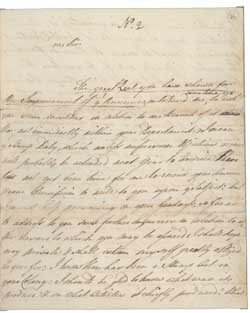Letter from Thomas Whately to John Temple, 14 August 1764
To order an image, navigate to the full
display and click "request this image"
on the blue toolbar.
-
Choose an alternate description of this item written for these projects:
- Main description
[ This description is from the project: Coming of the American Revolution ]
In the summer of 1764 Thomas Whately, Prime Minister Grenville's secretary, sent a letter to John Temple, Surveyor General in Boston, exploring the possibilty of extending a stamp tax to the colonies. The Massachusetts legislature had enacted its own stamp tax in 1755, and Whately was curious about its particulars.
A Tax Not Too Burdensome
Grenville knows he won't be able to wring enough revenue from the colonies with the Sugar Act. Even before that measure goes into effect, the treasury office sets about drafting new legislation to raise additional taxes from His Majesty's subjects in America. England already has stamp legislation in place for its own residents, but governmental and judicial systems in the colonies differ, which will affect how the tax is implemented in America. Carefully researching his boss's new plan, Thomas Whately, Grenville's secretary, sends letters of inquiry to various acquaintances in the colonies. In the summer of 1764, he writes John Temple, Surveyor General in Boston. The Massachusetts legislature had enacted its own stamp tax in 1755, and Whately is curious about its particulars.
Questions to Consider
1. If Grenville's intention is to raise revenue in the colonies, why does Whately insist that "It will be a principal object of attention here to make this tax as little burthensome as possible?" Whately also apologizes to Temple for asking him to do so much research but calls the subject important. Why does Whately think it is important?
Further Exploration
2. Whately inquires about "stampt cards & dice." Have you ever noticed that certain brands of playing cards have a stamp covering the opening flap of the deck box? Go to a stationery store and find such a deck of cards. Ask the store manager if you can sketch the stamp. Report to the class on what you have discovered.
3. Whately refers to "indentures of apprentice." What are these? Research trade apprenticeships and write a short essay explaining how they worked. Benjamin Franklin served an apprenticeship and wrote about it. Locate a children's or young adult biography of Franklin, and report on this aspect of his life.
4. Research the life of John Temple. Does he become a loyalist or a patriot? Give evidence for your conclusion.
5. In our own time, politicians and government agencies still request feedback from the public before they pass new laws or policies. Can you think of any recent examples from your own community or state? Explain how the public provides feedback (e.g., public hearings, polls, etc.)
6. Research the Massachusetts Stamp Act of 1755. What articles were taxed? Were there any protests over or objections to the act?

